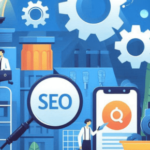Think about a world where customers don’t wait at all for support. This support can be both at night and during the day as AI chatbots stand out there to assist promptly. Virtual assistants are reshaping the way businesses relate with their customers, making this connection more expedient, smarter, and much more personal. This blog describes how AI chatbots impact contemporary customer service, its advantages and disadvantages, and in which way they reshape the nature of customer experience.
What are AI-powered Chatbots?
These AI-powered chatbots are virtual assistants, employing artificial intelligence that allows for the mimicry of human-like conversations. Unlike traditional bots based on predefined answers, AI-based chatbots make use of the powerful tools of Machine Learning and NLP to understand customer needs and query sensibly, and then respond accordingly.
Being dynamic in learning and evolving every second, such bots can help business establishments work out in order to be helpful and make effective customer support more easily achievable.
Impact of AI Chatbots in Customer Support
1. Around-the Clock Support
The biggest advantage that AI chatbots have is availability. As they are operating 24/7, customers may receive support anytime they might need it. The constant availability creates trust and increases satisfaction among customers.
2. Faster resolutions
With the wait for a reply in the queues of yore, the modern AI chatbots can process basic questions with speed, getting quick resolution to it, thereby saving customers’ time as well as support teams’ time.
3. Customer-centric Experience
AI-powered chatbots engage customers through personal information. The recommendation of a product or recalling the history of past issues provides meaningful engagements, hence giving users reasons to stick with their brand of choice.
Technology Used in AI Chatbots
AI chatbots operate on a mix of emergent technologies:
Natural Language Processing(NLP): This allows the chatbots to understand and interpret customer queries, even if they are worded uniquely.
Machine Learning (ML): It learns from the interaction. The more interactions, the better it gets at answering with relevance and accuracy.
System Integration: By directly interacting with backend systems, hence, a chatbot will interact with databases; receive access to the real time-from possibly account details, updates, and orders-by answering queries of the customer.
Major Features of a Successful Chatbot
1. Sophisticated Language Abilities
Good chatbots use NLP to read the messages of customers so well that conversations are always smooth.
2. Accessibility Across All Channels
Great chatbots offer support across apps, websites, and even social media for better accessibility.
3. Actionable Data Insights
The chatbots can collect valuable information about the customers, like what questions are most frequently asked or what customer behavior patterns are. Data will provide insights into improving services or eliminating pain points.
Real-Life Applications of Artificial Intelligence (AI) Chatbots includes:
1. Retail and E-Commerce
Retail and E-Commerce applications of chatbots in shopping experiences are providing suggestions on products, purchases, and updates on the status of orders.
2. Travel and Tourism
Chatbots in travel and tourism industries help customers plan a trip, get details of a destination, and reservation management.
3. Healthcare
In the healthcare sector, a chatbot is set up for scheduling appointments, giving medication reminders, and making inquiries about general health.
Problems and Solutions of AI Chatbot Implementation
Of all the benefits that come through AI chatbots, their problems include:
Poor Emotional Intelligence: Chatbots might experience problems with sensitive matters relating to empathy.
Dependence on Accurate Data: Inaccurate data will cause wrong answers and make the users frustrated.
Customization Costs: Developing a chatbot to meet a particular need might incur extra cost.
Solution: Overcoming these challenges Business can combine chatbot technology with human support especially for complex or emotional types of queries. Regular monitoring as well as updates also maintain consistency in performance.
Conclusion
AI-powered chatbots have taken customer support to a fast, efficient, and personalized interface. Businesses can provide their customers with round-the-clock support, streamline their operations, and also enhance user satisfaction through the use of AI-powered chatbots. As such, they are indispensable in the digital age due to the fact that they can improve and adapt through machine learning, though they do bring along some challenges, such as limited emotional understanding.
In order to implement such technologies, join digital marketing courses in Pune, digital marketing courses in Thane, or digital marketing courses in Surat. Such courses will provide you with the insight to use AI tools like chatbots and empower you to create innovative and engaging customer support strategies that drive long-term success.
Author:
Author: Prashant Kadukar, Founder & CEO, Digital Trainee
Bio: The founder and director of Digital Trainee, Mr. Prashant Kadukar has been an inspiration owing to his laurels all along. An MIT alumni, he happens to be a Google Ads & Bing Certified Professional. His decade long mastery in strategizing, designing, and implementing Digital Marketing plans and campaigns is well known. Mr. Prashant’s portfolio consists of serving 100+ Domestic and International clients, and consulting numerous startups on aspects such as strategy and growth. The workshops conducted by him have been insightful to an extent where the majority of the attendees have chosen a career in this field. Such has been the impact!



